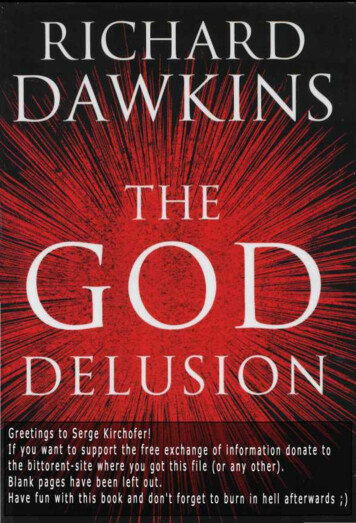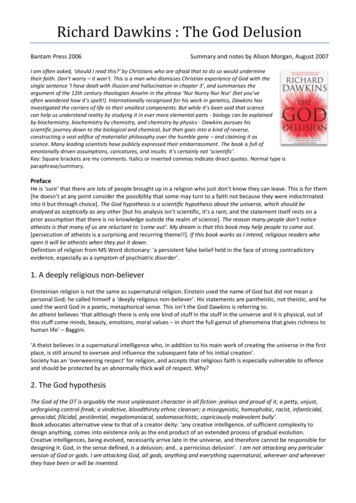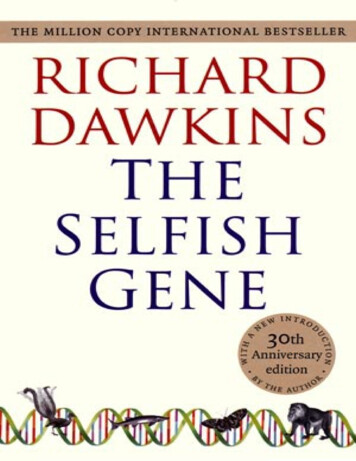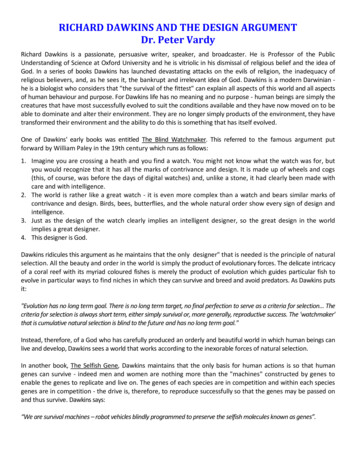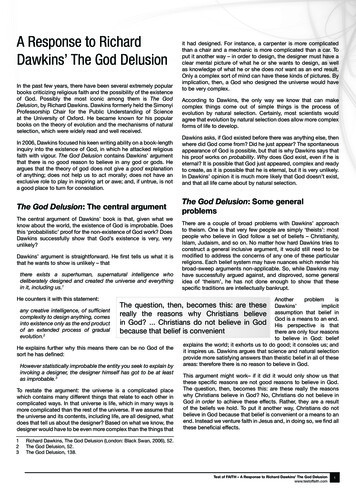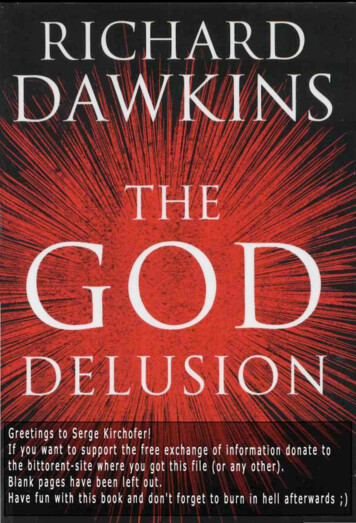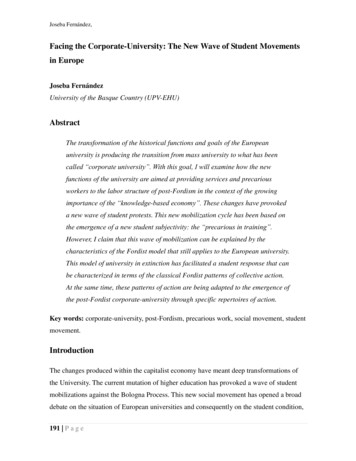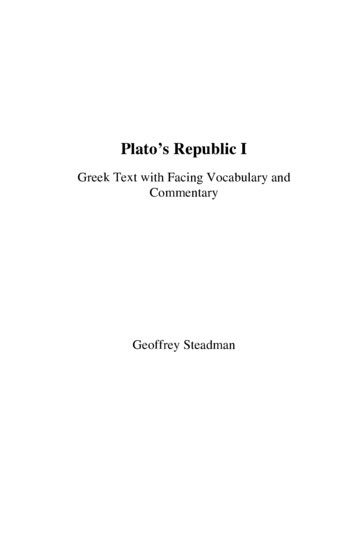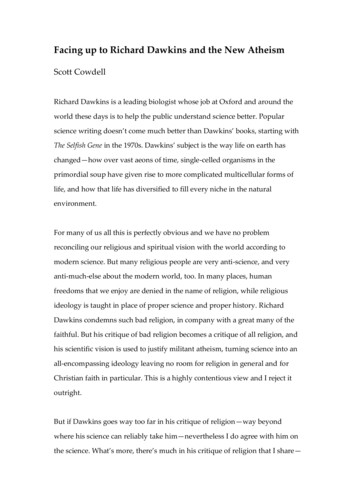
Transcription
Facing up to Richard Dawkins and the New AtheismScott CowdellRichard Dawkins is a leading biologist whose job at Oxford and around theworld these days is to help the public understand science better. Popularscience writing doesn’t come much better than Dawkins’ books, starting withThe Selfish Gene in the 1970s. Dawkins’ subject is the way life on earth haschanged—how over vast aeons of time, single-celled organisms in theprimordial soup have given rise to more complicated multicellular forms oflife, and how that life has diversified to fill every niche in the naturalenvironment.For many of us all this is perfectly obvious and we have no problemreconciling our religious and spiritual vision with the world according tomodern science. But many religious people are very anti-science, and veryanti-much-else about the modern world, too. In many places, humanfreedoms that we enjoy are denied in the name of religion, while religiousideology is taught in place of proper science and proper history. RichardDawkins condemns such bad religion, in company with a great many of thefaithful. But his critique of bad religion becomes a critique of all religion, andhis scientific vision is used to justify militant atheism, turning science into anall-encompassing ideology leaving no room for religion in general and forChristian faith in particular. This is a highly contentious view and I reject itoutright.But if Dawkins goes way too far in his critique of religion—way beyondwhere his science can reliably take him—nevertheless I do agree with him onthe science. What’s more, there’s much in his critique of religion that I share—
especially his criticism of religion that remains closed and fearful towardsscientific findings. I also think that Dawkins exposes some bad practice in theway we’ve regularly sought to commend Christian faith—we’ve used God toaccount for gaps in our scientific account of the world, but when scienceadvances those gaps are often closed and we don’t need to invoke God anymore. In short, I think that Dawkins helps us think about God more maturely,by undermining our spiritually immature attempts to use God as anexplanation, as a prop for a reassuringly stable view of things. Real Christianfaith is edgier than that.So, in what follows, I’m first going to introduce the science, so we understandwhere the controversy begins. Then I’m going to set out the way inadequatereligion responds to this extraordinary picture revealed by science. Ironically,however, we’ll see that in his un-subtle dismissal of all religion, Dawkinsmost clearly resembles the worst excesses of religion. I then want to ask howgood religion integrates modern science, and how we might spiritually andtheologically accommodate the story of life’s journey that Dawkins socompellingly sets out. Last of all, I’ll reflect briefly on how Christians mightrespond to Dawkins and to his kind more generally—to our many brilliantbut insufferably smug opponents. How do we best understand them, andhow do we best respond?Introducing the ScienceFirst of all, let’s talk about the science, and the story Dawkins tells of life’sjourney from the first single cells billions of years ago to the mind-bogglingdiversity of plants and animals we see around us today, ourselves included.How has all this happened?2
Essentially, it’s because creatures moving into different environments—on theearth, underground, in the sea, in the air, in hot places, and cold—have allhad to either adapt or perish. Occasionally an individual plant or animalproves better at it than the norm, so gaining the edge in survival, passing onthis advantage to its descendents. An example: there were light-colouredmoths in Victorian England that were invisible against the bark of trees, sopredatory birds couldn’t see them. The rarer black moths that emerged by thecombination of recessive genes in this population of moths were quicklyspotted. But when industrial pollution blackened the bark of trees, it was thelight-coloured moths that stood out, so they were picked off by the birds.Eventually, the black moths were the ones who survived and reproduced sothe population of moths became almost entirely black. In more recent times,environmental improvements have reduced the pollution, and the bark islight again, with the result that this population of moths is once again mostlylight coloured. What’s true in this example of a population adapting to itsenvironment in a single human lifetime provides an illustration for what’shappened with all life, across geological time.It’s a very simple process, really: given enough time, the pressures of survivalworking on creatures will occasionally favour a random mutation in the genepool of a species, and in time that species will change, and new species willemerge. This is how creatures in the sea eventually gave rise to randomoffspring who could survive out of the water, and their offspring in turnbegan to adapt to all the new opportunities that life on land offered.Eventually the great family of running, swimming and flying lizards calledthe dinosaurs perished. This gave the bright-eyed little mammals their chanceto take over, and today our family of warm-blooded creatures extends fromtiny mice to giant sperm whales, each having emerged to best exploit aparticular niche market in nature. Somewhere along the way, the primates3
and the earliest humans emerged as two forks in the road, and today wehumans with our toolmaking brains and hands have transformed the world.All this is called evolution by natural selection. It’s an idea that becameprominent with the English biologist Charles Darwin from the 1850s. Later,thanks to an Austrian monk called Gregor Mendel who bred garden peas andso began the scientific study of genetics, what’s been called ‘Darwin’sdangerous idea’ became a simple and powerful theory to account for all thediversity of life that we see. Nowadays, molecular genetics shows us the rootsof our own human genetic material in forms of life emerging earlier in theevolutionary process. It turns out that we share a lot of genetic material withinsects, more with reptiles, more again with other mammals, and all but 2% ofour DNA with our nearest relatives, the chimpanzees. In these ways, thenewer discipline of molecular genetics helps us to trace accurately our humanfamily tree. And not just to grandpa, who gave us our blue eyes or our bignose, but right back before our particular family emerged, to the origins ofhuman life in Africa and, before that, to pre-human life—to the age of thedinosaurs and life in the seas. Our genes carry the whole history of life onearth.Richard Dawkins coins the term the ‘selfish gene’ to explain the driving forceof this impersonal, natural process. The protein molecules called genesreplicate themselves in ever new individual creatures. He points out that theselfish gene drives our desire to survive and reproduce, making us careparticularly for our children and our siblings (because they share the mostgenetic material with us). The selfish gene even drives us to be reasonablyresponsible and moral people, because working together gave pre-historichuman communities their best chance in the struggle for survival. Anotherimportant part of Dawkins case is that these natural processes are entirely4
blind. That is, there’s no prior plan being worked out here. Given enoughtime and enough randomness and enough ill-fitted individual creaturesperishing to make room for fitter, stronger, more adaptable ones, weeventually get the whole teeming diversity of creatures that we see. Dawkinsshows us how life always finds a way, with his simple Darwinian algorithm.This is undoubtedly powerful and elegant science.Science and Religion at Enmity?So far so good, right? Wrong! And here I raise the whole matter of religion ingeneral, and Christian faith in particular. One of the things human beingsalways do is reflect on the wonder and complexity of the world of whichwe’re a part. All cultures have their own philosophical and speculative toolsfor understanding and coping with life, most of which we group togetherunder the catch-all title ‘religion’. And for most people in history it’s religionthey’ve turned to for understanding the origins of our world and life. Thiswas certainly true before science came up with its own powerful account ofhow things got to be the way they are, and it’s still true for a great manypeople today—many of whom look to the Bible.Whatever else it does as the emerging faith testimony of a particular people,our Christian Bible tried to provide answers for a pre-scientific world, and it’sstill looked to for such answers today. There’s nothing about evolution in theBible, however, and until the nineteenth century the Bible’s world of animalspecies fixed from the first week of creation, with a finite list of named humanancestors taking us back to those beginnings, could still seem plausible. Butfrom the nineteenth century we came to see that the world was much moreancient than just 6000 years, say, thanks to new discoveries in geology, whilewe begun to appreciate that the fossils we’d long been digging up pointed towhole families of creatures that had flourished and perished long ago. With5
Charles Darwin’s theory of evolution by natural selection capping-off thesediscoveries, the Bible and modern science seemed to be in opposition. Whatwere we to do?Some Christians resolved this apparent conflict by denying modern scienceand its view of a closed, self-sustaining natural world altogether. Accordingto them, God pulls all the strings and the so-called laws of nature that modernscience reveals are just a veil we humans invent, drawn over the actual detailsof God’s hidden working. John Calvin thought this way in sixteenth-centuryprotestant theology, before we had a sense of nature’s laws operating on theirown, but so did Karl Barth in twentieth-century theology. This was their wayof insisting on God’s absolute sovereignty, with nothing else—even the lawsof nature—allowed to compete with God. Such insistence on divinesovereignty hatches the view that all things, even bad things, happen for areason—that every natural occurrence is really God’s consciously intentionalact.The most extreme version of such views comes with biblical fundamentalism,which has no place for an independent natural order, or an independenthuman mind for that matter. The creation science movement is an influentialcurrent example. It attempts to fit-together scientific findings about thejourney of life with the Bible, insisting that all the different types of creaturewere really all together on the earth at once, right from the start—some eveninclude the dinosaurs—and that the earth, made and populated in six daysaccording to a literal reading of Genesis, is really only a few thousand yearsold. According to creationism, all scientific evidence to the contrary is either amisunderstanding or it’s a trick of the devil to trip us up in our pride.6
Creation science is bad science of course, because scientific method is basedon the idea that things have to be understood on their own terms, and not justbecause the Bible says so. Also, science works all of a piece, so that if theuniverse is only six thousand years old, then all our theoretical physics, ourastronomy, our thermodynamics is wrong, not just our evolutionary biology.Of course scientific method involves assumptions, but they’re such fruitfulassumptions. The fact that natural explanations keep being found foreverything makes a literal, fundamentalist view of the Bible seem ever moredesperate and contrary. But, of course, I’d argue that being contrary is the realpolitical motive behind creation science—also for a related ideology calledintelligent design, which is a kind of ‘creation science lite’ (that is, creationscience in which the religious basis is kept out of sight, pretending that theconclusions come from unbiased science alone, and not from the Bible).Creationism, like all fundamentalism, is really about asserting the power ofthe fundamentalist religious group over the power of the modernimagination—over the independent-mindedness of modern people and overthe secular freedom of today’s societies to go their own way beyondanybody’s controlling religious agenda. Like an aggrieved ex-spouse, thefundamentalist is resentful that the culture to which religion was oncewedded is now able to get along without it, and is moving on. Religion likethis, that wants to be in charge, isn’t interested in the sort of maturetheological conversation that might bring the Bible and the culture into somesort of mutually fruitful dialogue, so that science might help us understandthe Bible and the Bible’s vision might help us put science into a broaderimaginative context. More of this shortly.7
Dawkins is certainly right to criticise fundamentalism, but he’s certainlywrong to tar all religion with the fundamentalist brush. Ironically, he’s verylike a fundamentalist himself in the way he absolutises the scientific methodinto a quasi-religious crusade. This is the other way to go in the face of aperceived conflict between science and religion—the way of ‘scientificfundamentalism’ if you like—and we find it among many of today’s militantatheists.Where the religious fundamentalist dismisses science, Dawkins takes thefundamentalist path in reverse, dismissing religion as entirely incompatiblewith science. His most controversial book, The God Delusion, which has soldover a million copies, in many ways resembles a fundamentalist rant, but inthis case not a religious one. Dawkins insists that scientific method, which hasrevealed the wonder of evolution and of so much else about our world, is theonly valid type of human inquiry and imagination. We’ve heard that thebiblical fundamentalist sees all questions as essentially religious questionswith God as the sole actor in every event and the sole explanation for everyoutcome—any other view being seen to dishonour God. In the same way,Dawkins insists that nothing worth knowing is inaccessible to scientificinvestigation and everything humanly worthwhile can be fully accounted for.It seems to me that this is a battle of methodologies: you show me your Bibleand I’ll show you my science. Here are two competing priesthoods, rather likethe story of Elijah and his contest with the priests of Baal in the first book ofKings, with Dawkins the high priest of science winning hands down overreligion. Is this all about power and winning, too, like religiousfundamentalism? Dawkins denies this of course, insisting that scientificmethod is open to examination and disproof, while religious conviction is not8
open to testing and hence puts itself beyond criticism. But here Dawkinsshows his failure to understand both bad science and good theology.Latest philosophy of science, which many working scientists ignore at bestand despise at worst, views science on par with other areas of human culture,like art and literature and religion. To be sure, science has a powerful method,but that method can only address part of reality. It can tell us why thescattering of light rays from the sun in our atmosphere makes the sky blue,for instance, but it can’t account for just how good it feels after days of cloudand rain to open our curtains in the morning to reveal a clear blue sky.Likewise, scientists like Dawkins insist that theirs is an unbiased anddispassionate discipline, but the history of science tells a different story. Itshows how the scientific community clings to outmoded ideas and suspectsnew developments until the contrary evidence proves overwhelming, withmany advances in scientific understanding resisted from within the scientificcommunity itself, not just from outside. The scientific community is political,and structured by power relations, just as religious communities are, and ifscience does eventually move on in its understanding, then so too do healthyreligious communities.The Church has advanced and reformed and responded with humility toperceived challenges and invitations from God over time, in just the sameway that the scientific community has eventually embraced new theories andparadigms of understanding. Dawkins is perhaps at his least scientific here,despising the Church and religion to the extent that he fails to observe it withsufficient scientific rigour. Religion can be bad, and fearful, and political, yes,yet the Old Testament prophets challenged all that, just as Jesus did, and StPaul. The earliest monks challenged it by retreating to the desert from thecorruptions of an only loosely-Christianised Empire; the Protestant Reformers9
challenged it, and today all the mainstream theologians and Churches thatDawkins refuses to acknowledge challenge the fundamentalist control ofreligion. Dawkins’ obvious hatred of the Church and its claims blinds him toeverything that’s plainly good in the Church, despite its many faults.Dawkins is unscientifically-minded in his assessment of religion and, if youwill, he’s religiously-minded in his uncritical endorsement of science as theonly path to truth and the only purely moral human undertaking.Surely both bad religion and bad science need condemning—Dawkins rightlypoints to the horrors committed in the name of religion, but he refuses toadmit the violence that arrogant atheism entails, with its entirely closed andunaccountable world view. Look what happens to science when it’s shorn ofany broader context of meaning and moral purpose, rendered entirelyinstrumental and detached from any religious vision of the worth of thehuman person. This leads to a range of identifiable abuses, from the medicalexperiments of the Nazis, for instance, to the worst excesses of environmentalabuse and unjustifiable cruelty in animal experimentation. Look, too, at theanti-religious mania of Stalin’s purges—for every free-thinker punished bybad religion, there was a priest or a nun murdered in Stalin’s Gulag. Dawkinssays that you can’t blame atheism for such atrocities committed by atheistregimes. But if he’s right, then neither can you blame religion per se for thefaults of some religious groups and individuals. Rather, human arrogance isto blame, and that can be found equally in the world of science and atheism asit can in the world of religion. So if good science is healthily self-critical, asDawkins rightly points out, then so is good religion, as he seems scarcely ableto comprehend, let alone admit.10
Scientific and Christian?Let’s now consider how we might move beyond the alleged incompatibility ofscience and religion. Dawkins is not impressed by the fact that manyscientists are religious, holding together their commitment to evolutionarybiology, for instance, with their profound sense that God is neverthelesscreating the world through evolutionary means. In other words, he rejects anythird option, beyond the fundamentalism of religion, which allows nochallenge or insight from science, and also beyond the fundamentalism of hisown scientific understanding, which insists on a closed world of scientificexplanation leaving no room for God. I want to point to this third, nonfundamentalist way for us to go, beyond these two options to whichDawkins’ imagination is confined.First, let me say what won’t work, and Richard Dawkins helps us see this allthe more clearly. What won’t work any more is using God as a scientificexplanation. Isaac Newton in the seventeenth century had discovereduniversal gravitation and the mathematics of planetary motion, but hecouldn’t work out why the orbits of planets didn’t decay. So Newtonsuggested that God used angels to keep the planets in their stable orbits. But,before long, the French mathematician Laplace improved on Newton’sexplanation, providing a purely scientific account of stable planetary orbits.Napoleon supposedly asked Laplace where God was in this new, selfcontained celestial mechanics, to which Laplace supposedly replied, ‘I haveno need of that hypothesis’. This little story provides a salutary warning. IfGod is used to fill a gap in our scientific explanation of nature, what happensto our God when scientific understanding advances to fill that gap?At the beginning of the nineteenth century, an English Archdeacon calledWilliam Paley produced a classic argument in his book Natural Theology. He11
said that if you found a watch while walking on the heath, you wouldn’timagine it had just taken form there by purely natural means. Rather, you’drightly suppose that a watchmaker had crafted it. In the same way, thenatural world (much beloved of English parson naturalists) must be thedetailed creation of a designer God. This so-called argument from design hasa venerable history, and many Christians still argue for belief in God based onthe sheer improbability of life’s wonderful complexity. But Dawkins knowshow genetic mutation plus natural selection plus enough time can produce allwe see by purely blind and random processes, with each new stage buildingfortuitously on what went before. In books with titles like The BlindWatchmaker and Climbing Mount Improbable, Dawkins shows that thecomplexity of life is built up by stages. Eventually, by trial and error, andfeedback from the environment, the blindfolded partygoer succeeds inpinning the tail on the donkey, just as the Easter egg-hunting children finallydiscover the whole stash. There’s no map, however. There’s just explorationof the environment by trial and error over time, much as over time we find allthe buried mineral deposits, building up the map as we go.Nowadays there are more sophisticated versions of the argument fromdesign. The so-called ‘strong anthropic principle’ is based on our recentdiscovery that the fundamental building blocks of matter and energy in ouruniverse have to be just as they are for the universe to be able to support life,and human life—without the speed of light, the mass of the electron and theexact balance of forces in the atomic nucleus being just as they are, forinstance, to many decimal points of accuracy, our universe wouldn’t have gotgoing. The ‘Big Bang’ might have petered out in a fraction of a second, or theuniverse mightn’t have advanced beyond hydrogen and maybe helium, letalone the carbon and all the heavier elements made in collapsing stars thatprovide the base matter for organic life. And on the macro level, if our Earth12
wasn’t just the right distance from the sun for the temperature to befavourable, and if Earth’s axis wasn’t tilted just right for there to be properseasons, then there’d be no human life.All this is true, of course, and our wonder at these mind-boggling facts ofphysical science helps explain why so many scientists are open to religiousfeeling. But the strong anthropic principle doesn’t work as a proof for theexistence of God. Remember, there’s no map available in advance. Theuniverse built itself up over time, with each stage making the next stagepossible. If these fundamental constants of physics were different, anyuniverse that emerged and proved stable enough would take a differentdirection from our universe and, if life emerged in it, that life would evolvequite differently from life on Earth. It’s one thing to discern a pattern inevents with hindsight, but that doesn’t mean a detailed plan was beingworked out from the beginning. Humans have evolved because it waspossible in this sort of universe, not because this sort of universe was set upfrom the beginning so humans could evolve in it.So if we’re to believe in God today, it won’t be because of what we learn fromphysics and biology. They may contribute to the sense of wonder that’s at theheart of a religious temperament, but our faith is based on more than that—on an overall sense of God. It’s based on our experience of finding anunaccountable power at work in our hearts to guide and reorient our lives,with the greatest miracles always being those of personal change. It’s basedon a sense of forgiveness and transformation of life beyond the paralysis andshame so typical of human moral experience. For Christians, it’s also based onhow the story of Jesus Christ and the Bible as a whole so powerfullyilluminates our experience of living, so that faith essentially becomes selfauthenticating.13
Even a relative conservative like the recently canonised nineteenth-centurytheologian John Henry Newman rejected Archdeacon Paley’s version of theargument from design, acknowledging that people of faith don’t arrive attheir conviction by any sort of proof based on nature. So Richard Dawkins, ineffectively demolishing the argument from design, leaves intact the basis offaith. Faith in God certainly respects the facts of life, including those ofscience, but faith isn’t the product of a chain of right reasoning. Coming tofaith is like falling in love, which can’t be reduced to a compelling list ofsomeone’s attributes, as if you could specify exactly, in advance, theappearance, habits and qualities of the person you’ll fall in love with. Thefrequently-married Dawkins certainly understands falling in love, but not Isuggest the related set of dynamics whereby all sorts of people are grasped bythe conviction of God’s reality and fall in love with God.God’s Action in the WorldIf we do believe in God as creator of the universe and still at work within it,through Jesus Christ in the Holy Spirit, yet if we also believe that RichardDawkins has got the science more or less right, as I do, so that the universemakes itself, then how do we hold these convictions together? I think thereare essentially two ways.One way is to see God as a kind of parent who sets up the household andmostly leaves the children to do their own thing—because it’s good for themto learn and explore on their own, making them grow into more confident,competent adults. But occasionally this God steps in when it’s important to doso—preventing a kitchen accident here, or introducing a new opportunitythere, to protect the children and to guide them towards worthwhilepossibilities. All parents understand this finely-tuned program of remote14
supervision with occasional intervention, and this is how many Christiansimagine God at work in Dawkins’ universe. Life evolves naturally, butoccasionally God steps in and helps the next stage of life to emerge. Maybe allit took was for God to help a particular creature make a particularadvantageous discovery—a new food source, perhaps—for what God knewto be the next big thing in evolution to kick off. In the same way, within themore familiar timescale and events of our own lifetimes, many people believethat God intervenes to guide and protect us—putting the right people alongour path in life, for instance, also guarding us from harm.Some theologians speculate that God might be directing things from withinthe closed weave of our most sophisticated scientific understanding, so that ata level too small to see, too subtle to measure, God makes all these sorts ofthings happen. The outcomes that occur with statistical randomnessaccording to quantum mechanics, for instance, may cloak the hidden action ofGod, just as the sort of global effects that chaos theory explores might allowGod to be tweaking the weather system as a whole, say, in order that ourprayers for rain might be answered.All this is certainly conceivable. But there’s a downside to this approach. Partof it we’ve seen already. As far as we know, life evolves and finds ways togreater complexity without need for such special interventions. Also, peopleof faith come to internalise the presence of their divine parent, so in time welearn the spiritual discernment that doesn’t need God to be explicitly guidingour steps or opening doors for us. We experience God allowing us genuinechoices and helping us deal with the stuff that happens, enabling us to learnand grow through it all, rather than directing our lives to a particularoutcome in a more or less hands-on way. There are two other problems withthe intervening God. One involves the so-called ‘problem of evil’. If God15
intervenes to help and guide, then why not more interventions to restrainmore of life’s great evils, both natural and human? This is a question Dawkinsand other atheists have long been asking, and rightly. Another problem withan intervening God is that such a God becomes an outsider to God’s ownworld. Modern science has done such a good job explaining things that allthis God can do is intervene in the game from the sidelines.A better account of God’s action in the world involves a small but significantshift of imaginative perspective. Instead of being an outsider to a closedworld of scientific law—instead of a gremlin who invades nature’s systemfrom the outside, like a computer virus—what if we imagined God asimmanent within the processes of nature? What if our transcendent God ofawe and majesty, beyond nature and history, is also the immanent principleof all nature and history, so that God inhabits God’s own creation, providinglife with its broad impulse toward adapting? If so, God’s way with the worldcan be seen in the way a viable physical universe has created the conditionsfor life bit by bit, and also in the way life has adapted, with the selfish geneseen to be God’s instrument of life’s emergence within the closed weave ofnatural causality—though without specifying the details in advance.In the same way that I can lift, throw or run within the limits of my body’sphysical capacities, so God can be imagined at work ‘inside’ natural causality,as the broad spirit of life—but also bringing particular outcomes when Godwishes, though only by acting entirely within nature’s ‘free processes’ (asJohn Polkinghorne calls them) and humans’ own free will. Thus all miraclesare really natural events in which God’s action and natural processes areindistinguishable. In the same way, when God guides and leads us humans,we experience ourselves at the same
Richard Dawkins is a leading biologist whose job at Oxford and around the world these days is to help the public understand science better. Popular science writing doesn’t come much better than Dawkins’
